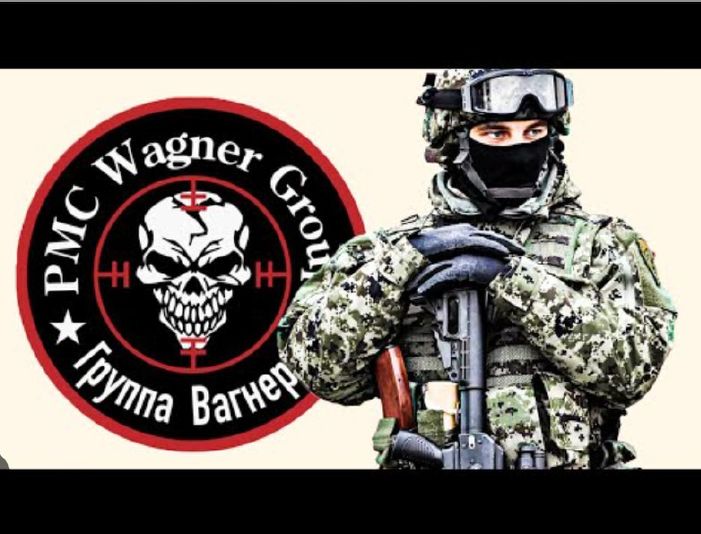
Dear Office, What an amazing end to last week when on Friday, it was announced that Wagner Group soldiers had left the front lines of the war with Ukraine and were headed to Moscow for a showdown with Vladimir Putin.
Who are the Wagner Group Mercenaries?
They are a Russian paramilitary organization that operates beyond the law in Russia, where private military companies are officially forbidden. But because it operates in support of Russian interests, it receives military equipment from the Russian Ministry of Defence, and its leader, Yevgeny Prigozhin, has been a long-time ally of Vladimir Putin. The Wagner Group is truly an evil force with a capacity for horrific savagery — including the executions of deserters, rape, torture, and murder of prisoners and civilians.
The Wagner mercenaries have taken part in conflicts around the world, including the civil wars in Syria, Libya, the Central African Republic, and Mali, often fighting on the side of forces aligned with the Russian government. Wagner has played a significant role in the Russian invasion of Ukraine, for which it recruited 40,000 prison inmates from Russia for frontline combat.
The Wagner Rebellion:
As an unofficial arm of the Kremlin’s armed forces, the Wagner Group has been among Putin’s most dependable — yet expendable soldiers. They were thrown into the most brutal meat-grinding battles of this war around Bakhmut and suffered massive losses.
Over the past several weeks, the Wagner Group’s leader, Yevgeny Prigozhin, had been openly and brazenly criticizing the Russian Ministry of Defense for not only its handling of the war but the whole basis upon which it was launched. Then, on June 23, over the course of a little more than 24 hours, Prigozhin announced his troops would leave their positions on the front in Ukraine and head toward Moscow on a “justice march.”
Within hours, Wagner fighters had crossed into Russia and occupied the city of Rostov-on-Don, facing no opposition. After reportedly shooting down several Russian helicopters and airplanes and coming within a few hundred kilometers of Moscow, Prigozhin suddenly announced that his convoys would turn around and retreat to their field camps. At this writing, it is still unclear as to what precipitated the retreat and ultimately Prigozhin’s exile to Belarus.
Why was this rebellion significant?
Many believe Prigozhin succeeded in weakening Putin’s grip on power and exposing severe weaknesses in Russia’s Ministry of Defence, but he will also be remembered for exposing the lies on which Russia’s invasion of Ukraine was based.
Throwing down the gauntlet, Prigozhin dared to declare publicly that Putin’s rationale for attacking Ukraine was based on lies. Not only was the pretext for the aggression contrived (de-Nazification of Ukraine, NATO expansion, protecting Russian speakers in Ukraine) but the very areas and people in eastern Ukraine that the Kremlin claimed to be saving have ended up in an even worse situation suffering “harsh treatment at the hands of their protectors” as you will see in the following diary accounts of brother Andrey.
It is too early to tell how this will impact the war in Ukraine, but our hearts and prayers, and actions are focused on the countless thousands of people in eastern and southern Ukraine who are suffering so much and need our support. THANK YOU for working alongside us as we continue to bring hope and help to Ukrainians. Please continue to pray for peace.

EPISODES FROM THE WAR

The following journal entries are authored by Brother Andrey, a HART ministry partner originally from the Donetsk region of Ukraine, where the war is now at its fiercest. As Andrey and his team minister to those in the conflict areas, we have a unique opportunity, through this diary, to be introduced to people who, through no fault of their own, are caught up in a war and are just trying to survive. The pain and suffering are real, but so is the incredible courage and compassion Ukrainian Christians display daily.
Greetings, our dear friends!
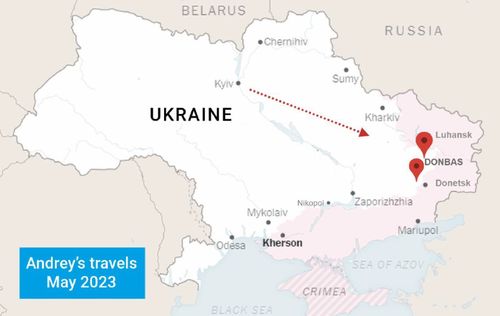
These diary entries are a great opportunity to express our gratitude once again for your support in assisting the people of Ukraine. Your compassion, prayers, financial contributions, and various useful items have been immensely valuable. We deeply appreciate your involvement and constantly feel your unseen presence in our ministry. We thank God for each and every one of you, dear brothers and sisters!
My wife, Tanya, and I returned from another trip to the Donbas region just yesterday. I want to use this journey as an example to shed light on the current situation in the war zone and describe our activities there.
DAY 1: We are en route to Donbas, which are two eastern provinces of Ukraine (Donetsk and Luhansk) that are known collectively as the “Donbas,” and it refers to the rich geologic coal basin which turned the region into Ukraine’s industrial heartland.
Once again, we are passing through villages in the Kharkiv region that Russian troops have completely destroyed while they occupied this region.
Despite being a de-occupied territory, life has yet to return to these areas. My wife finds it difficult to hold back tears when she sees a sign on a destroyed building as we drive by. It’s not just a sign but a heartfelt plea from the local residents (In English: “Please! Help rebuild the village!”). Only God knows who will undertake this task and when it will happen…
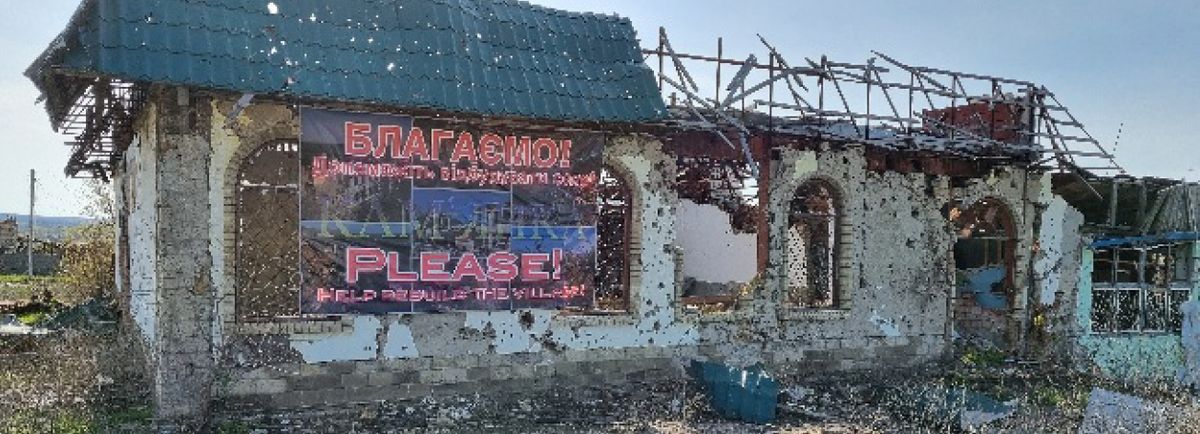
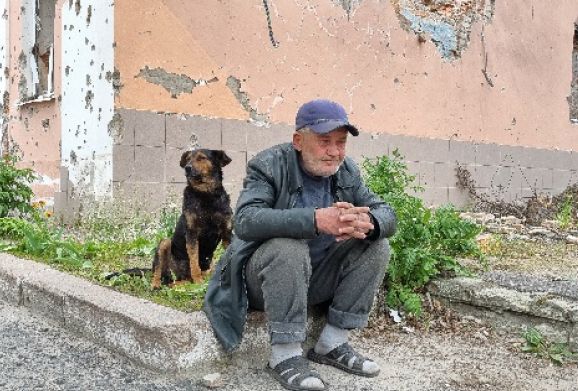
In the dilapidated town of Izyum, we meet Nikolay. His house has been burned down, forcing him to move in with his mother. With no job opportunities in the city, he relies on humanitarian aid to survive. He asks us for 20 Hryvnia, likely for a drink. Rather than giving him money, we share with him the food we have.
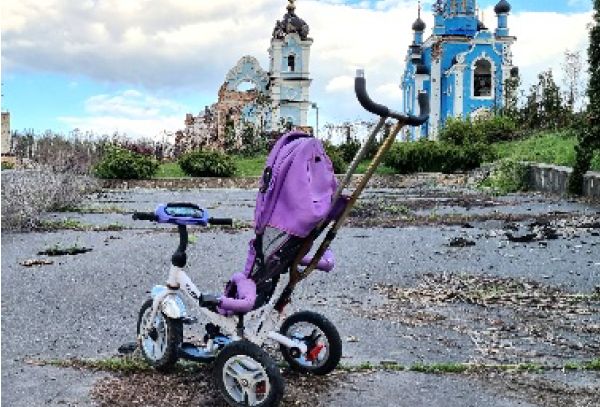
We decide to proceed towards Svyatogorsk, a town regarded as the pearl of the Donbas. Its surroundings boast stunning features such as rivers, forests, and chalk mountains. One of these mountains is home to an ancient Orthodox monastery. However, reaching Svyatogorsk proves challenging as the bridge spanning the river has been destroyed by an explosion. Instead, we explore the nearby village of Bogorodichnoye. Tragically, there are scarce surviving houses in this village, as everything has been ravaged by shells, rockets, and mines. The sight of the ruined church is particularly disheartening.

The village feels eerily empty, almost devoid of people – a true ghost town. However, we do come across a few people. One of them is Lyubov, a 67-yearold widow. Only the walls of her house remain standing, and she now lives in a cellar. Despite the desolation, she perseveres in her efforts to restore some semblance of order. Lyubov tirelessly rakes through the rubble and takes out the trash. She adamantly declares that she will not leave her native village, especially since it holds sacred places where people feel a close connection to God. We offer her shoes, milk, and additional food items to help ease her situation.
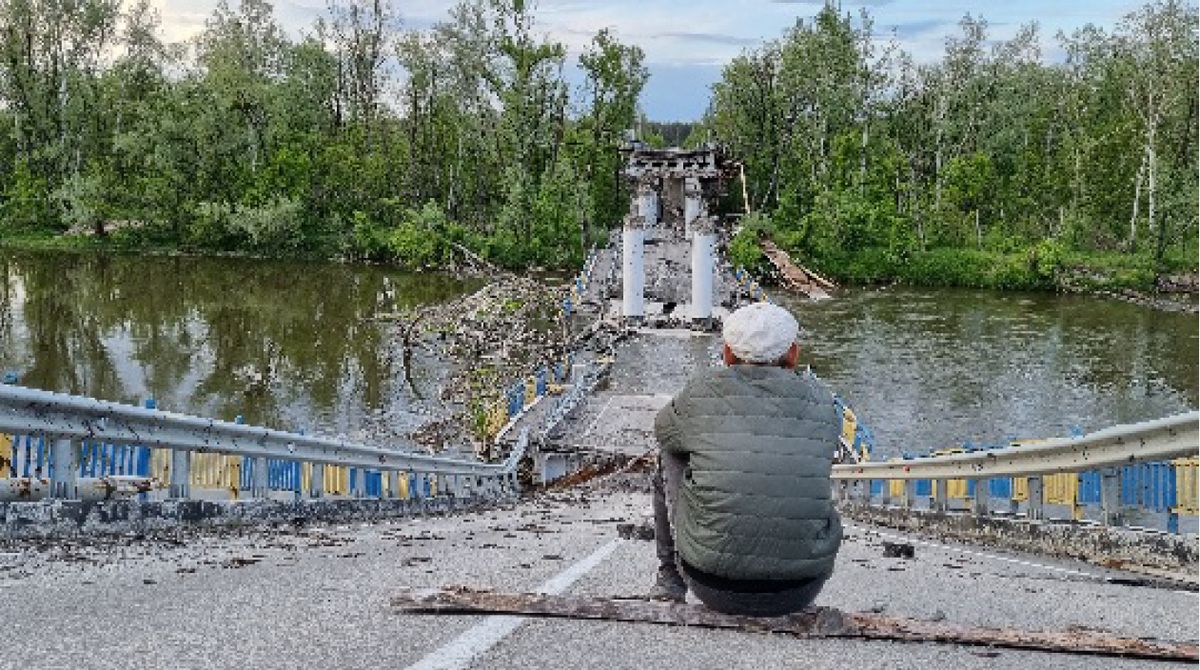
On the destroyed bridge, we meet Yaroslav, a 17-year-old young man. He is waiting for the water level to decrease so that he can safely cross to the other side and reach Svyatogorsk. There, he mentions the presence of civilization, where electricity and Internet connection are already available.
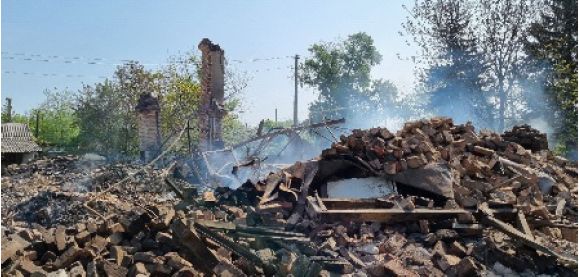
At the end of our trip, we finally made a stop in Svyatogorsk and witnessed the state of what the young boy called “civilization.” Unfortunately, it was also in complete ruin, just like everywhere else that had experienced the Russian forces and their so-called “liberation.”

By evening, we arrive in Druzhkovka, located approximately 30 kilometers away from the front line. The sounds of war are clearly audible here. Rockets increasingly fly overhead, reaching even the city itself. We find accommodation at the Design Christ Church. As always, life here is bustling. Refugees reside within its walls, chaplains find shelter for the night, and local residents come for water and humanitarian aid. The church will serve as our base during these days.
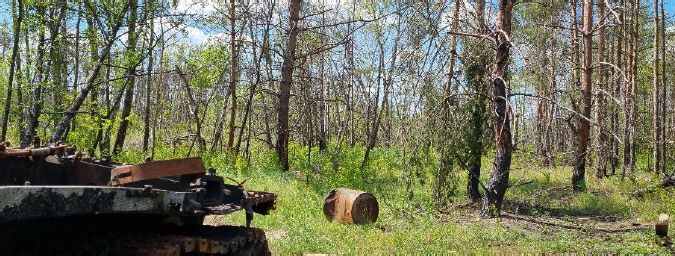
DAY 2: Today, our plan takes us to Seversk, a small town on the front line in the Bahmut district. We go here together with Sergey Severin, my travel partner, on war trips for nearly a year. He is a devoted, compassionate brother who sacrifices himself for the sake of others. Our car is loaded with water, bread, batteries, gasoline, hygiene products, clothing, and pillows for the field military hospital. We have also brought First Aid medical kits for the soldiers.
We drive through untouched forests, which are now filled with blackened, charred trees and remnants of burned military equipment. Venturing into the forest is dangerous due to land mines. It is said that Ukraine currently has the highest concentration of mines in the world. Complete de-mining, according to some estimates, will take at least 10 years. Thanks to the “liberators”…
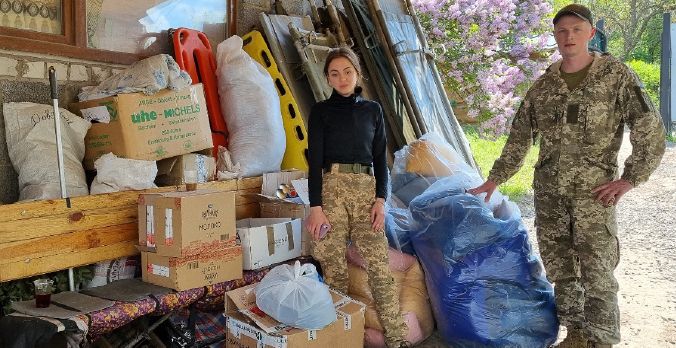
On the way, we stop at a ‘stabilization’ point. It is a field hospital where wounded soldiers from the front line are brought for emergency medical care. They are later transferred to hospitals on the “mainland.” Last time, they asked us to bring pillows. These pillows are needed for transporting the wounded on stretchers. I posted a request for pillows on Facebook, and within a couple of days, the need was fulfilled. We hand over the pillows, clothing for the injured, milk, and sweets to the medical staff. They don’t have much time for us here; the hospital is not a place for idle conversation as they are working tirelessly to save the lives of wounded soldiers day and night. We bid our goodbyes and continue on our way.
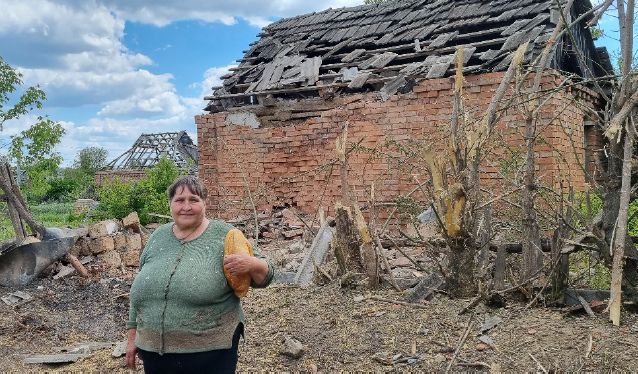
In Seversk, we explore new areas that we haven’t been to before. Very few volunteers come here. We met Tatiana during our last visit. She is an open and friendly woman. She asks us to take her photo and send it to her son via messenger. She can’t do it herself because there is no connection in the city. Her son lives abroad and wants her to join him. However, she strongly refuses. She has a 30-acre garden here and wonders who would take care of it if she leaves. I sent the photo as requested. We take such requests seriously and understand how important it is for people.
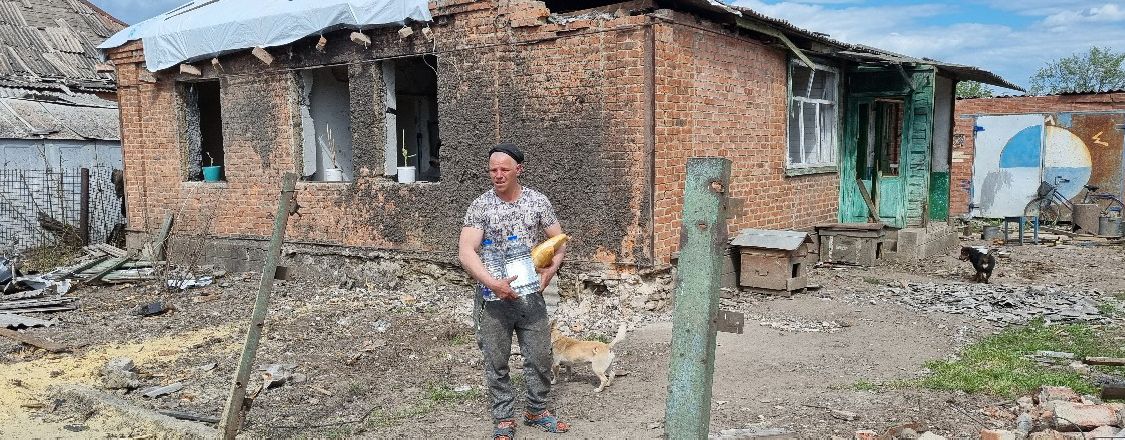
Misha, a man in his forties, sent his family to relatives in central Ukraine at the beginning of the war. We respect him for this decision, as not everyone acts so wisely and often puts their women and children in danger. He stayed behind to take care of the household. In early May, a shell hit his house. It’s unlikely that it can be restored. But Misha is trying to do something about it – he covered the roof with plastic and is clearing away the debris.
It seems like he can’t fully accept the reality that he and his family have lost their home. We can’t offer much assistance in this situation. We advise Misha not to cling to the ruins and to go be with his family. We offer help with evacuation, but he refuses. We give him bread, water, and gasoline. We share the same supplies with Misha’s neighbors as well.
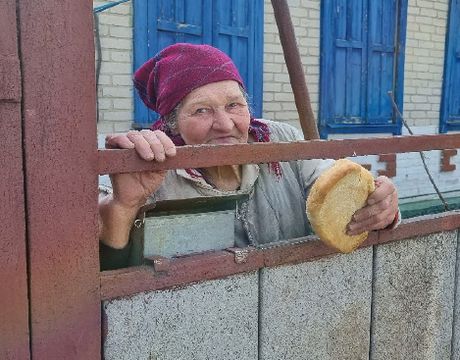
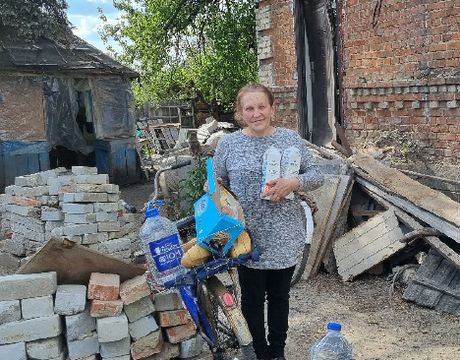
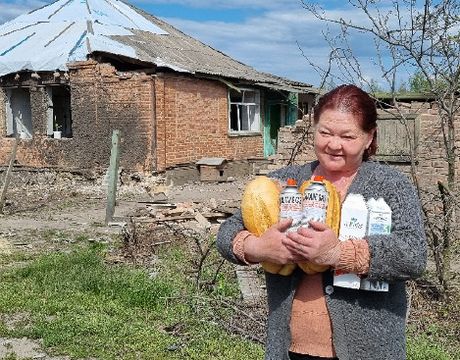
We have dozens of similar encounters today. Sometimes we have to take cover as the shelling is very close.
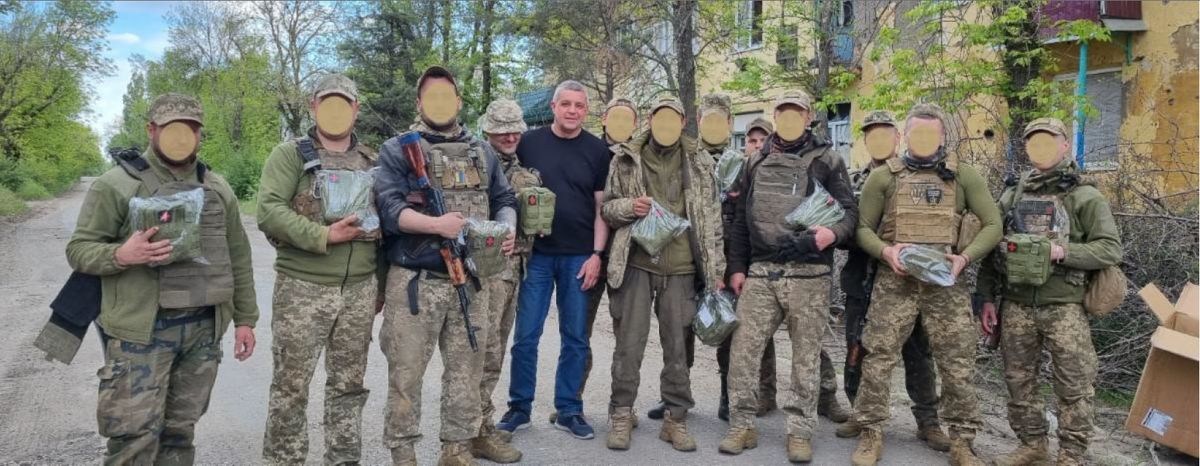
As we approach some of our military troops, we ask them, “Guys, do you need first aid kits?” Big smiles. They are excited. They won’t refuse. We quickly distribute the first aid kits, aware that any movement can be detected by drones. We express our wishes that the kits won’t be needed by the guys. We hug them and quickly leave. A big thank you from the Ukrainian defenders to our partners from the HART mission who provided these first aid kits!
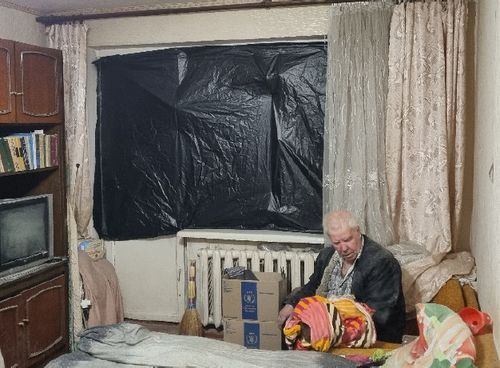
By evening, we head back to the base. On the way, we learn that Druzhkivka was under shelling. Sergey speeds up – his family is there. It turns out the missile hit a residential five-story building. Many apartments are damaged. Thank God, everyone is alive. Sergey’s relatives are also safe. We are heading to the site where the missile hit a residential building. We offer the affected people shelter in our refugee homes, but they refuse. They ask for help in covering their windows with plastic. We assist them with that. It’s the last task for today, an unplanned one. Exhausted and already in the dark, we return to the base.
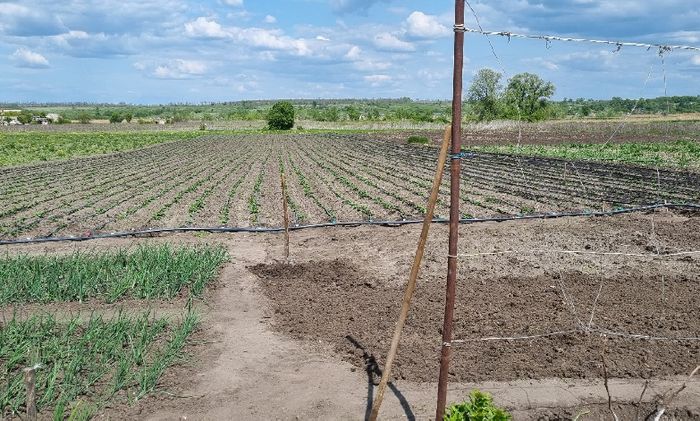
Day 3: We set out for Lyman district. It’s a territory that has been de-occupied, but it’s still not safe. The enemy is not far away and could easily attempt to retake the Zarechnoye village. Before the war, it was a prosperous village. People here grew early potatoes, which sustained their livelihoods. They lived quite well, as can be seen from their houses and yards. But now, potatoes are not the priority, not for everyone.
Surprisingly, we met people who planted their 50-acre gardens and set up irrigation systems. Just a couple of kilometers away are the positions of the Russians, yet these people hope for a harvest and the opportunity to sell it. It’s heartbreaking to see that their houses are destroyed, and they are living in a cramped one-room summer kitchen.
But their determination and sincerity to make things work are inspiring. God willing, I will return here to buy potatoes from them. I will buy a lot. I will distribute those potatoes in Severodonetsk and Druzhkivka. The people asked not to be photographed, but they allowed us to capture a picture of their garden.
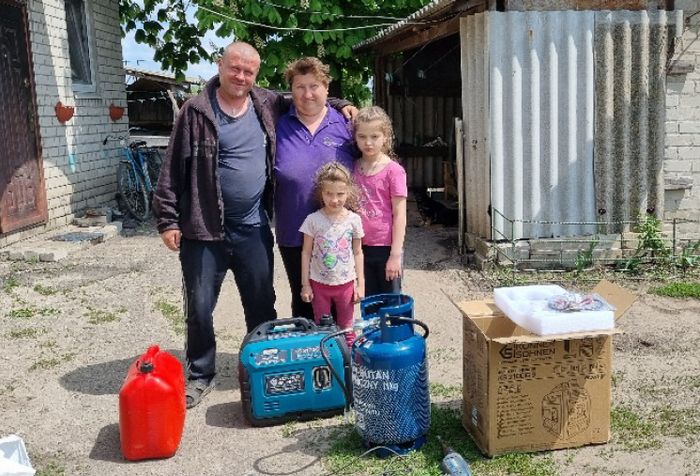
There are also children in the village. We cannot understand the logic of their parents as to why they don’t evacuate them. Our arguments have no power to influence the situation. But what we can do is try to improve the lives of the children. We provide a generator to the family. It is a necessary item as there is no electricity in the village. We express our gratitude to our partners from HART mission who have supplied us with generators for providing assistance in such situations.
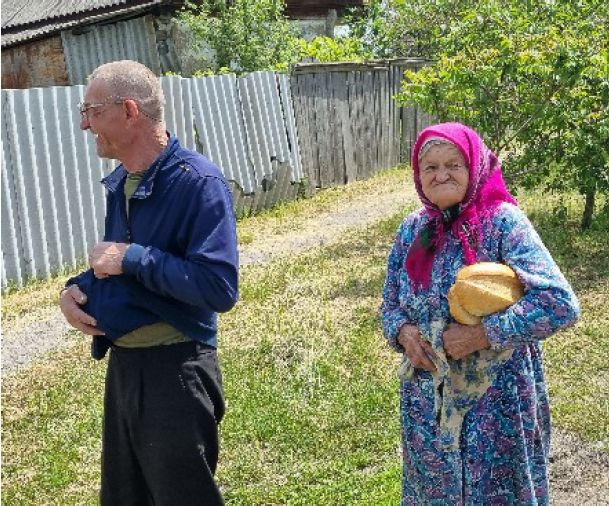
We continue to drive around the village, encountering new acquaintances and hearing similar stories. They are told almost without emotions. There are no emotions left. Only pain remains. We become increasingly silent. We listen. We suggest praying. We cry. We hug people.
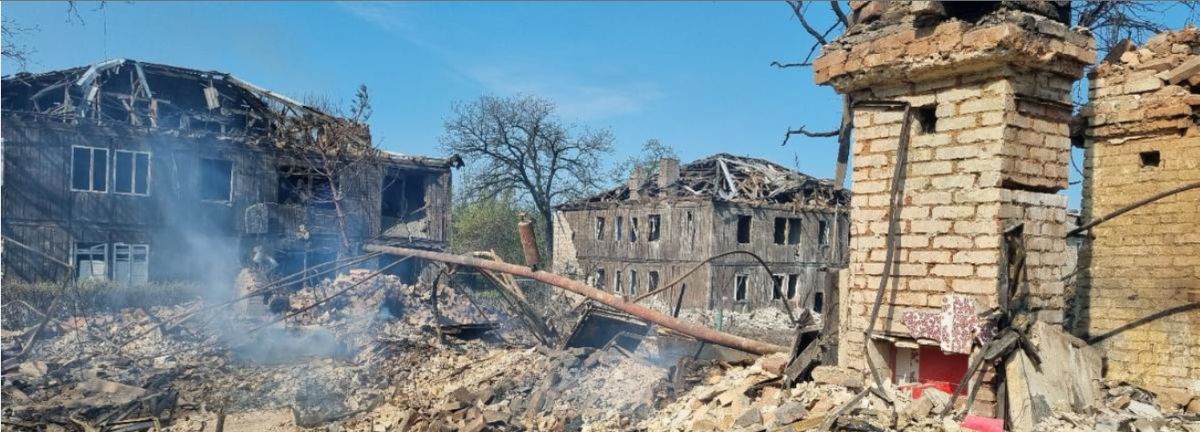
Day 4: Sunday. We are heading to New York. There is a village with that name near the front line. New York greets us with the smell of lilacs and acrid smoke. A few days ago, there was shelling, and several residential houses burned down. The remains of the fire are still smoldering. Several men wander among the ruins, trying to find anything that survived from their belongings.
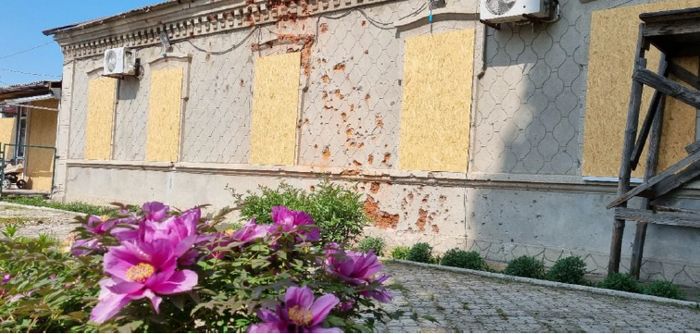
In the village, there is an evangelical church, and that’s where we are heading. Before the war, it was a cozy church, hosting crowded gatherings, young families, and various ministries such as children’s and youth ministries, as well as assistance to the residents of the village. Now, there is only a small group of elderly sisters left. There are hardly any brothers. The pastor and other ministers were forced to leave. The church building has suffered from shelling; the windows are broken, the roof and walls are damaged.

Sister Lyubov Ivanovna, an elderly sister, conducts the church services and takes care of the church building. The services are very simple: people sing together, Sister Lyuba reads from the Gospel, explains it to the best of her ability, and then they pray together. It’s worth mentioning that there are also new people attending – sometimes humanitarian aid is brought to the church, and people primarily come for that.
We try to visit this church, offering spiritual support and sharing what we have. Last time, we brought a generator, fuel, and gas for it. The village experiences frequent power outages, so generators are essential in frontline areas. Once again, we would like to thank our partners from HART for providing generators! As you can see, they are absolutely essential in the frontline areas. This time, we also brought household chemicals and hygiene products.
After the church service, one of the sisters asks us to visit her son. The apartment where he lived with his family was recently destroyed in shelling. They are now living in the basement. The elderly woman requests, “Please see how you can help them settle in the basement.”
We go there, but at that moment, shelling begins. We rush into the basement. There are four children in dim light, dampness, and foul air. We try to convince the father to evacuate. He responds with the usual excuses: “Who needs us anywhere? Shelling is everywhere. Look, our neighbors went abroad for a while and came back.”
We realize that our persuasions are futile. We do not consider it right to create comfortable conditions in the basement instead of evacuating people and taking care of them in a safe place. We say our goodbyes and leave. We do not take any photos as it is a delicate situation involving children.
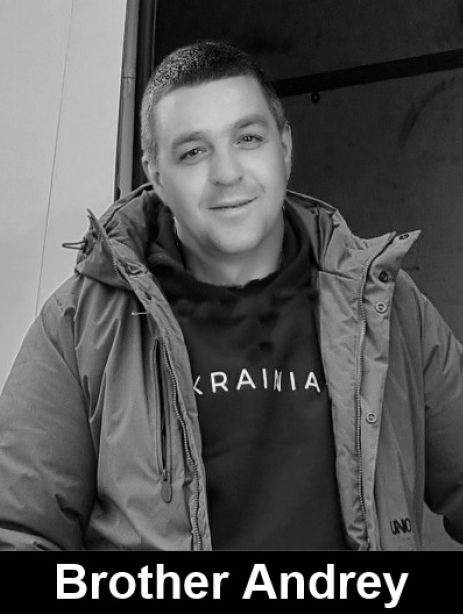
Day 5: I should have written here: “We return with a deep sense of satisfaction from what we have accomplished during these days, with joy in realizing our involvement in great and noble deeds.” But I won’t write that. There is little satisfaction or sense of accomplishment. Seems like we didn’t do anything grand or significant.
Instead, there is emptiness. From the endless stories of pain and suffering. From shattered destinies. From lost lives. From extinguished eyes, especially those of children in basements. From the faces drained of color. From human sorrow. From the habits people have developed, like scavenging for humanitarian aid and distinguishing between incoming or outgoing volleys when hearing the sound of an explosion, and from self-deception, pretending that everything will soon be back to normal. And all this in the areas of Bakhmut and Lyman, where the “liberators” have been particularly relentless.
Then I recalled how we covered a broken window with plastic in Druzhkovka a couple of days ago. It seems to me that our entire activity is like that plastic on the windows. It doesn’t really solve anything. It has little impact. Long-term results are minimal. We simply address the immediate needs. And those under our care don’t have any long-term plans either.
So, I wonder, is it worth it – just plastic on some windows? And I answer myself – it is worth it. If many of us take care of at least one window, we can rebuild the house. We just need to know that someone in the neighboring apartment is also working on a window. I speak figuratively, referring to our efforts in this war.
I know so many people are doing what they can. That’s when the despondency fades away, and satisfaction emerges. I have done everything I could. Pillows, generators – to the hospital, first aid kits – to the soldiers on the frontlines, bread, water, stoves – to the population, the Word of God – to the surviving church.
Others have done and are doing their part too. That means there will be results! And that’s why we are already planning our next trip. While it’s summer, while the days are long – we must accomplish a lot. Thank you to everyone who stands with us! May the God Almighty bless you.
With love in Christ,
Andrey Malov and the Team of the Light of the Resurrection Mission
YOUR SUPPORT empowers and equips the National Church and partners like Andrey
to be Christ’s hands and feet throughout this terrible war.
Support BAKERIES through the Ukraine Crisis Fund.
Thank you for your ongoing support of HART!

Here are specific prayer points that can help guide our prayers for the situation in Ukraine. Please share these with your friends and family:
- Pray for the physical protection and provision for Ukrainian children in harm’s way. Supernaturally and otherwise, minimize the suffering and loss of life. Pray for children who see things no child’s eye should ever see. Jesus, you are a great King and healer. By whatever means you choose — loving parents, a direct work of the Holy Spirit, fellow believers… protect children’s hearts, minds, and imagination.
- Pray for and ask to see God’s glory amid this great struggle. Pray that He would be glorified through the Christians in Ukraine who are being his hands and feet during this tragedy.
- Pray for God’s peace to strengthen and encourage the thousands of Ukrainian workers/volunteers serving refugees and the poor in their communities, who need to hear of God’s love for them through these Christian workers.
- Pray for God’s protection for soldiers and civilians caught up in this conflict.
- Pray for the residents of cities and towns who are under heavy shelling and have lost their heat, lights, and water.
- Pray for the civilian and military prisoners of war who are subject to torture and death at the hands of their captors.
- Ask God to comfort the many families that have lost mothers, fathers, sons and daughters, brothers and sisters during this Russian invasion.
The pain and heartache are overwhelming for most families. - Pray for the frustration of all evil plans of the enemy.
- Ask God to intervene. Pray for wisdom for world leaders. Pray God would move in their hearts and guide their steps and plans to end this war.
- Pray for the President (Zelensky) and the leaders of Ukraine to know God’s truth and peace and be transformed by his Holy Spirit so that they would seek to lead their country in the way of peace.
- Ask that this conflict would open doors of opportunities for the gospel. Pray that He would make his name known across Ukraine, Russia, and all the European countries refugees are fleeing to due to this conflict.

